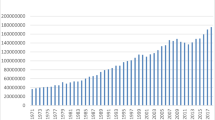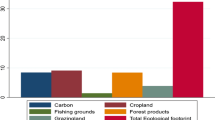Abstract
Recently, the potential role of social indicators in environmental degradation gets immense attention. Environmental degradation and income inequality are two of the hot topics of debate that anticipate urgent solution. However, income inequality-CO2 emissions nexus has been little investigated in the literature. This study explores the relationship between income inequality and carbon dioxide emission by incorporating globalization and human capital as the determinants of this relationship. The study deploys an innovative technique of dynamic auto-regressive distributive lag simulation to evaluate data covering the period 1980–2015. Findings indicate that unequal distribution of wealth negatively affects carbon emissions. Likewise, the results show that globalization and human capital contribute to environmental degradation. The inclusion of transmission variables validates findings of the study. Policy strategies toward better income distribution and positive externalities of globalization are suggested for sustainability transitions.





Similar content being viewed by others
Availability of data and materials
Data will be available from authors upon reasonable request.
Abbreviations
- ARDL:
-
auto-regressive distributive lag
- CUSUM:
-
cumulative sum
- DARDL:
-
dynamic auto regressive distributive lag
- DF-GLS:
-
Dickey-Fuller generalized least square
- EKC:
-
environmental Kuznets curve
- FDI:
-
foreign direct investment
- FMOLS:
-
fully modified ordinary least square
- GDP:
-
gross domestic product
- GHGs:
-
greenhouse gasses
- MPE:
-
marginal propensity to emit
- PWT:
-
Penn World Table
- STIRPAT:
-
Stochastic Impacts by Regression on Population, Affluence, and Technology
- UNDP:
-
United Nation Development Program
- ZA:
-
Zivot-Andrews
- β:
-
Parameter
- Α:
-
Intercept
- μ:
-
Error term
- ω:
-
Error term
- ∆:
-
Change
- ∑:
-
Summation
References
Alderson, A.S., Nielsen, F., 2002. Globalization and the great U-turn: income inequality trends in 16 OECD countries. Am. J. Sociol. 107, 1244–1299+I. https://doi.org/10.1086/341329
Aluko OA, Osei Opoku EE, Ibrahim M (2021) Investigating the environmental effect of globalization: insights from selected industrialized countries. J Environ Manage 281:111892. https://doi.org/10.1016/j.jenvman.2020.111892
Aslam B, Hu J, Hafeez M, Ma D, AlGarni TS, Saeed M, Abdullah MA, Hussain S (2021) Applying environmental Kuznets curve framework to assess the nexus of industry, globalization, and CO2 emission. Environ Technol Innov 21:101377. https://doi.org/10.1016/j.eti.2021.101377
Balaguer J, Cantavella M (2018) The role of education in the environmental Kuznets curve. Evidence from Australian Data Energy Econ 70:289–296. https://doi.org/10.1016/j.eneco.2018.01.021
Baležentis, T., Liobikienė, G., Štreimikienė, D., Sun, K., 2020. The impact of income inequality on consumption-based greenhouse gas emissions at the global level: a partially linear approach. J. Environ. Manage. 267. https://doi.org/10.1016/j.jenvman.2020.110635
Baloch A, Shah SZ, Noor ZM, Magsi HB (2017) The nexus between income inequality, economic growth and environmental degradation in Pakistan. GeoJournal. https://doi.org/10.1007/s10708-016-9766-3
Baloch MA, Danish Khan SU-D, Ulucak ZŞ, Ahmad A (2020a) Analyzing the relationship between poverty, income inequality, and CO2 emission in Sub-Saharan African countries. Sci Total Environ 740, 139867. https://doi.org/10.1016/j.scitotenv.2020.139867
Baloch MA, Ozturk I, Bekun FV, Khan D (2020b) Modeling the dynamic linkage between financial development, energy innovation, and environmental quality: does globalization matter? Bus Strateg Environ bse.2615. https://doi.org/10.1002/bse.2615
Bano S, Zhao Y, Ahmad A, Wang S, Liu Y (2018) Identifying the impacts of human capital on carbon emissions in Pakistan. J Clean Prod 183:1082–1092. https://doi.org/10.1016/j.jclepro.2018.02.008
Boyce JK (1994) Inequality as a cause of environmental degradation. Ecol Econ 11:169–178. https://doi.org/10.1016/0921-8009(94)90198-8
Brzezinski M (2018) Income inequality and the Great Recession in Central and Eastern Europe. Econ Syst 42:219–247. https://doi.org/10.1016/j.ecosys.2017.07.003
Chen J, Xian Q, Zhou J, Li D (2020) Impact of income inequality on CO2 emissions in G20 countries. J Environ Manage 271:110987. https://doi.org/10.1016/j.jenvman.2020.110987
Danish (2019) Moving toward sustainable development: the relationship between water productivity, natural resource rent, international trade, and carbon dioxide emissions. Sustain Dev sd.2007. https://doi.org/10.1002/sd.2007
Danish, Baloch MA, Mahmood N, Zhang JW (2019a) Effect of natural resources, renewable energy and economic development on CO 2 emissions in BRICS countries. Sci Total Environ 678, 632–638. https://doi.org/10.1016/j.scitotenv.2019.05.028
Danish, Hassan ST, Baloch MA, Mehmood N, Zhang J, (2019b) Linking economic growth and ecological footprint through human capital and biocapacity. Sustain Cities Soc 101516. https://doi.org/10.1016/J.SCS.2019.101516
Demir C, Cergibozan R, Gök A (2019) Income inequality and CO2 emissions: empirical evidence from Turkey. Energy Environ 30:444–461. https://doi.org/10.1177/0958305X18793109
Dreher A (2006) Does globalization affect growth? Evidence from a new index of globalization. Appl Econ 38:1091–1110. https://doi.org/10.1080/00036840500392078
Elliott, G., Rothenberg, T.J., Stock, J.H., 1996. Efficient tests for an autoregressive unit root. Econometrica.
Feenstra RC, Inklaar R, Timmer MP (2015) The next generation of the penn world table. Am Econ Rev 105:3150–3182. https://doi.org/10.1257/aer.20130954
Fu X (2008) Foreign direct investment, absorptive capacity and regional innovation capabilities: evidence from China. Oxford Dev Stud 36:89–110. https://doi.org/10.1080/13600810701848193
Grottera C, Pereira AO, La Rovere EL (2017) Impacts of carbon pricing on income inequality in Brazil. Clim Dev 9:80–93. https://doi.org/10.1080/17565529.2015.1067183
Grunewald N, Klasen S, Martínez-Zarzoso I, Muris C (2017) The trade-off between income inequality and carbon dioxide emissions. Ecol Econ 142:249–256. https://doi.org/10.1016/j.ecolecon.2017.06.034
Hailemariam A, Dzhumashev R, Shahbaz M (2020) Carbon emissions, income inequality and economic development. Empir Econ 59:1139–1159. https://doi.org/10.1007/s00181-019-01664-x
Hassan ST, Xia E, Khan NH, Shah SMA (2019) Economic growth, natural resources, and ecological footprints: evidence from Pakistan. Environ Sci Pollut Res 26:2929–2938. https://doi.org/10.1007/s11356-018-3803-3
Heerink N, Mulatu A, Bulte E (2001) Income inequality and the environment: aggregation bias in environmental Kuznets curves. Ecol Econ 38:359–367. https://doi.org/10.1016/S0921-8009(01)00171-9
Hübler M (2017) The inequality-emissions nexus in the context of trade and development: a quantile regression approach. Ecol Econ 134:174–185. https://doi.org/10.1016/j.ecolecon.2016.12.015
Jordan S, Philips AQ (2018) Cointegration testing and dynamic simulations of autoregressive distributed lag models. Stata J 18:902–923. https://doi.org/10.1177/1536867x1801800409
Jorgenson A, Schor J, Huang X (2017) Income inequality and carbon emissions in the United States: a state-level analysis, 1997–2012. Ecol Econ 134:40–48. https://doi.org/10.1016/j.ecolecon.2016.12.016
Kasuga H, Takaya M (2017) Does inequality affect environmental quality? Evidence from major Japanese cities. J Clean Prod 142:3689–3701. https://doi.org/10.1016/j.jclepro.2016.10.099
Khan AQ, Saleem N, Fatima ST (2018) Financial development, income inequality, and CO2 emissions in Asian countries using STIRPAT model. Environ Sci Pollut Res 25:6308–6319. https://doi.org/10.1007/s11356-017-0719-2
Khan Z, Ali S, Dong K, Li RYM (2021) How does fiscal decentralization affect CO2 emissions? The roles of institutions and human capital. Energy Econ 94:105060. https://doi.org/10.1016/j.eneco.2020.105060
Kripfganz, S., Schneider, D.C., 2018. Response surface regressions for critical value bounds and approximate p-values in equilibrium correction models.
Kusumawardani D, Dewi AK (2020) The effect of income inequality on carbon dioxide emissions: a case study of Indonesia. Heliyon 6:e04772. https://doi.org/10.1016/j.heliyon.2020.e04772
Lan J, Kakinaka M, Huang X (2012) Foreign direct investment, human capital and environmental pollution in China. Environ Resour Econ 51:255–275. https://doi.org/10.1007/s10640-011-9498-2
Langnel Z, Babington G (2020) Globalization, electricity consumption and ecological footprint : an autoregressive distributive lag ( ARDL ) approach. Sustain Cities Soc 63:102482. https://doi.org/10.1016/j.scs.2020.102482
Law SH, Naseem NAM, Lau WT, Trinugroho I (2020) Can innovation improve income inequality? Evidence from Panel Data Econ Syst 44:100815. https://doi.org/10.1016/j.ecosys.2020.100815
Le HP, Ozturk I (2020) Environ Sci Pollut Res 27(18):22680–22697. https://doi.org/10.1007/s11356-020-08812-2
Liu C, Jiang Y, Xie R (2019a) Does income inequality facilitate carbon emission reduction in the US? J Clean Prod 217:380–387. https://doi.org/10.1016/j.jclepro.2019.01.242
Liu Q, Wang S, Zhang W, Li J, Kong Y (2019b) Examining the effects of income inequality on CO2 emissions: evidence from non-spatial and spatial perspectives. Appl Energy 236:163–171. https://doi.org/10.1016/j.apenergy.2018.11.082
Mader S (2018) The nexus between social inequality and CO2 emissions revisited: challenging its empirical validity. Environ Sci Policy 89:322–329. https://doi.org/10.1016/j.envsci.2018.08.009
Mahalik MK, Mallick H, Padhan H, Sahoo B (2018) Is skewed income distribution good for environmental quality? A comparative analysis among selected BRICS countries. Environ Sci Pollut Res 25:23170–23194. https://doi.org/10.1007/s11356-018-2401-8
Mahmood N, Wang Z, Hassan ST (2019) Renewable energy, economic growth, human capital, and CO2 emission: an empirical analysis. Environ Sci Pollut Res 26:20619–20630. https://doi.org/10.1007/s11356-019-05387-5
Pata UK, Caglar AE (2020) Investigating the EKC hypothesis with renewable energy consumption, human capital, globalization and trade openness for China: evidence from augmented ARDL approach with a structural break. Energy 119220. https://doi.org/10.1016/j.energy.2020.119220
Pesaran MH, Shin Y, Smith RJ (2001) Bounds testing approaches to the analysis of level relationships. J Appl Econom 16:289–326. https://doi.org/10.1002/jae.616
Phillips, P., Perron, P., 1988. Testing for a unit root in time series regressions. biometrika 75, 335–346. https://doi.org/10.2307/2336182
Rafindadi AA, Usman O (2019) Globalization, energy use, and environmental degradation in South Africa: startling empirical evidence from the maki-cointegration test. J Environ Manage 244:265–275. https://doi.org/10.1016/j.jenvman.2019.05.048
Rahman MM (2020) Environmental degradation : the role of electricity consumption, economic growth and globalisation. J Environ Manage 253:109742. https://doi.org/10.1016/j.jenvman.2019.109742
Ravallion M, Heil M, Jalan J (2000) Carbon emissions and income inequality. Oxf Econ Pap 52:651–669. https://doi.org/10.1093/oep/52.4.651
Ridzuan S (2019) Inequality and the environmental Kuznets curve. J Clean Prod 228:1472–1481. https://doi.org/10.1016/j.jclepro.2019.04.284
Sager L (2019) Income inequality and carbon consumption: evidence from environmental engel curves. Energy Econ. 104507. https://doi.org/10.1016/j.eneco.2019.104507
Sahu SK, Patnaik U (2020) The tradeoffs between GHGs emissions, income inequality and productivity. Energy Clim Chang 1:100014. https://doi.org/10.1016/j.egycc.2020.100014
Sarkodie SA, Adams S, Owusu PA, Leirvik T, Ozturk I (2020) Mitigating degradation and emissions in China: the role of environmental sustainability, human capital and renewable energy. Sci Total Environ 719:137530. https://doi.org/10.1016/j.scitotenv.2020.137530
Sarkodie SA, Owusu PA (2020) How to apply the novel dynamic ARDL simulations (dynardl) and Kernel-based regularized least squares (krls). MethodsX 7:101160. https://doi.org/10.1016/j.mex.2020.101160
Scruggs LA (1998) Political and economic inequality and the environment. Ecol Econ 26:259–275. https://doi.org/10.1016/S0921-8009(97)00118-3
Uddin MM, Mishra V, Smyth R (2020) Income inequality and CO2 emissions in the G7, 1870–2014: evidence from non-parametric modelling. Energy Econ 88:104780. https://doi.org/10.1016/j.eneco.2020.104780
Ulucak R, Bilgili F (2018) A reinvestigation of EKC model by ecological footprint measurement for high, middle and low income countries. J Clean Prod 188:144–157. https://doi.org/10.1016/j.jclepro.2018.03.191
Ulucak R, Danish K, S.U., (2020) Does information and communication technology affect CO2 mitigation under the pathway of sustainable development during the mode of globalization? Sustain Dev 28:857–867. https://doi.org/10.1002/sd.2041
Uzar U, Eyuboglu K (2019) The nexus between income inequality and CO2 emissions in Turkey. J Clean Prod 227:149–157. https://doi.org/10.1016/j.jclepro.2019.04.169
Wu R, Xie Z (2020) Identifying the impacts of income inequality on CO2 emissions: empirical evidences from OECD countries and non-OECD countries. J Clean Prod 277:123858. https://doi.org/10.1016/j.jclepro.2020.123858
Yang J, Yang ZK, Sheng PF (2011) Income distribution, human capital and environmental quality: empirical study in China. Energy Procedia 5:1689–1696. https://doi.org/10.1016/j.egypro.2011.03.288
Zhang L, Godil DI, Bibi M, Khan MK, Sarwat S, Anser MK (2021) Caring for the environment: how human capital, natural resources, and economic growth interact with environmental degradation in Pakistan? A Dynamic ARDL Approach. Sci Total Environ 774:145553. https://doi.org/10.1016/j.scitotenv.2021.145553
Zhu H, Xia H, Guo Y, Peng C (2018) The heterogeneous effects of urbanization and income inequality on CO2 emissions in BRICS economies: evidence from panel quantile regression. Environ Sci Pollut Res 25:17176–17193. https://doi.org/10.1007/s11356-018-1900-y
Zivot E, Andrews DWK (1992) Further evidence on the great crash, the oil-price shock, and the unit-root hypothesis. J Bus Econ Stat 10:251–270
Funding
The study is supported by Guangdong Philosophy and Social Sciences Planning 2021 General Project “Influence Mechanism and Countermeasure of Supply and Demand of Labor Force on Regional Economic Growth in Greater Bay Area of Hong Kong and Macao Study’ Grant (GD21CYJ26).
Author information
Authors and Affiliations
Contributions
Nan Li conceived of the presented idea and developed the theory; Recep Ulucak verified the analytical methods and contributed to the final version of the manuscript; Danish Khan performed the computations and supervised the findings of this work as well.
Corresponding author
Ethics declarations
Ethics approval
Not applicable.
Consent to participate
Not applicable.
Consent for publication
Not applicable.
Competing interests
The authors declare no competing interests.
Additional information
Responsible Editor: Ilhan Ozturk
Publisher's note
Springer Nature remains neutral with regard to jurisdictional claims in published maps and institutional affiliations.
Rights and permissions
About this article
Cite this article
Li, N., Ulucak, R. & Danish Turning points for environmental sustainability: the potential role of income inequality, human capital, and globalization. Environ Sci Pollut Res 29, 40878–40892 (2022). https://doi.org/10.1007/s11356-021-18223-6
Received:
Accepted:
Published:
Issue Date:
DOI: https://doi.org/10.1007/s11356-021-18223-6




